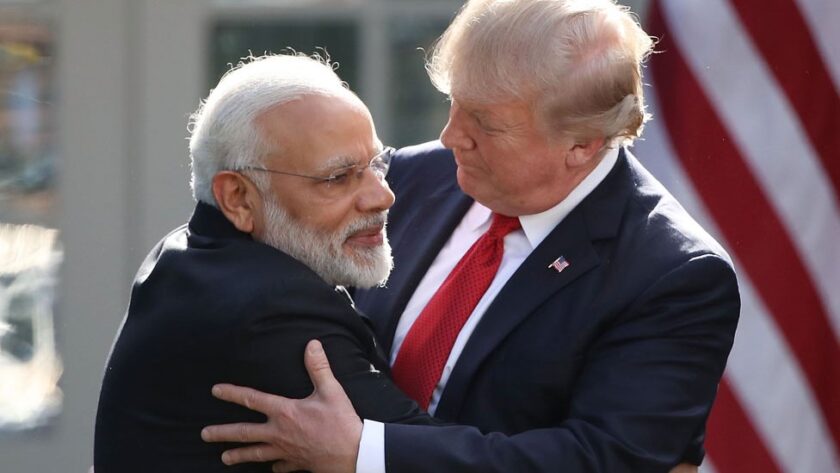New Delhi – In an exclusive conversation with Firstpost, New Zealand Prime Minister Christopher Luxon, currently on a five-day official visit to India, spoke candidly about his engagements so far, his relationship with Prime Minister Narendra Modi, and the growing synergy between India and New Zealand. Luxon, who is also the chief guest at this year’s Raisina Dialogue, emphasized the need to shift the bilateral relationship “from neutral to gear.”
“It’s been an absolutely fantastic visit”
Welcoming PM Luxon to India, we began by asking about the significance of this visit – his first as New Zealand’s Prime Minister.
“Look, it is a really important visit, and it’s been absolutely fantastic so far,” Luxon said, noting his productive meeting with Prime Minister Modi. “He and I have hit it off very well. We’ve got similar approaches to how we want to deliver for our people.”
Luxon revealed that he is leading the largest-ever delegation to accompany a New Zealand prime minister abroad, comprising business leaders, community representatives, and an indigenous Māori performing arts group.
“We’re having a lot of fun, seeing a lot of people, and learning a lot in the process. India and New Zealand are two countries that should be much closer, and this visit is a step towards deepening and broadening that relationship,” he added.
“India is dynamic, innovative, and full of talent”
Luxon, who previously worked with Unilever and spent time with its Indian arm, Hindustan Unilever, recalled his first exposure to India in his mid-20s.
“I’ve had huge respect for the talent that comes out of India. It’s a dynamic and innovative country,” he said, admiring India’s progress over the last three decades, especially in lifting 250 million people out of poverty.
“That’s not just a statistic. It means individuals and families now have more choices in life. That’s what political leadership is about—creating opportunities for people.”
India-New Zealand: From Friends to Strategic Partners
On the evolving nature of the India-New Zealand relationship, Luxon remarked:
“In a multi-polar world, India is a significant regional and global player. For New Zealand, India is critical to our security, prosperity, and future society. It’s a relationship with massive potential.”
He emphasized that the two countries have long admired each other, but now need to “put the car into gear” and act on that goodwill.
Relationship with PM Modi: “Warm and Results-Oriented”
On his rapport with Prime Minister Modi, Luxon described it as “warm and very strong”.
“I enjoy his company, and I think we think very similarly about getting results for our people. We discussed deepening our defense, security, and economic ties, and boosting people-to-people connections, especially in education and sport,” Luxon said.
On Trade: “We’re Moving Fast”
Luxon’s visit has brought fresh momentum to trade talks, including discussions on a comprehensive Free Trade Agreement (FTA).
“When I took office 16 months ago, deepening ties with India was a priority. There’s been a real commitment from both sides to build this relationship. Yes, global dynamics may have changed, but our engagement was already underway,” he stated.
Asked whether the tariff wars under former US President Donald Trump have influenced global trade strategies, Luxon remarked:
“Not really. For us, it was about logic—India and New Zealand are great countries that haven’t done enough together. We’re moving fast, and while there are sensitivities, I believe we have the right approach.”
“New Zealand is open for business and investment”
Luxon has described New Zealand as an attractive destination amid global volatility, which some have interpreted as a veiled reference to geopolitical uncertainties, including the Trump administration’s economic policies.

“It wasn’t about Trump. It’s about acknowledging the volatile global environment. New Zealand is a safe haven for investment. Last week, we hosted investors representing $6 trillion in funds, outlining opportunities in public infrastructure and emerging sectors,” he said.
On Elon Musk and Starlink’s Entry into India
Given his reported rapport with Elon Musk, Luxon was asked about potential advice for Musk’s Starlink venture in India.
“My job is to act in New Zealand’s national interest. Any business decisions between Musk and India are for them to decide. I’m focused on advancing New Zealand’s interests,” Luxon firmly responded.
Indo-Pacific Peace and Security: A Shared Priority
On regional security, Luxon highlighted India and New Zealand’s cooperation in the Indo-Pacific, particularly through Maritime Force Command 150, which New Zealand currently leads with India as Deputy Commander.
“We’ve got a New Zealand frigate arriving in Mumbai this week. There’s significant potential to deepen cooperation in defense and security, especially maritime. Peace and security underpin prosperity, and we’re aligned on this,” Luxon emphasized.
Looking Ahead
As PM Luxon’s historic visit progresses, with engagements across diplomacy, trade, culture, and defense, he remains optimistic about the future of India-New Zealand ties.
“We’ve got momentum. Now it’s time to translate potential into performance,” he concluded.
New Zealand Prime Minister Christopher Luxon, during his visit to India, addressed concerns raised by the Indian government over the presence and activities of Khalistani separatist groups operating in New Zealand. In a candid interaction, Luxon reaffirmed his country’s commitment to upholding freedom of speech while ensuring that all actions within New Zealand comply with its legal framework.
Responding to questions about the recent Khalistani referendum held in New Zealand and India’s objections to it, Luxon said, “In our democracy, we believe in freedom of speech. We expect that speech to be legal and compliant. Our police enforce the law and ensure it is upheld. People are entitled to voice protests, but they must do so legally.”
Luxon acknowledged that the Indian government has raised concerns about groups such as Sikhs for Justice (SFJ), which is banned in India and is considered a terrorist organization by New Delhi. He maintained, however, that as a sovereign nation with robust legal institutions, New Zealand addresses such matters through its own legal system.
“I’ve heard the broad perspective of the Indian government on this issue. As a democracy that respects sovereign borders, we have strong laws to protect free speech, but also to ensure it remains within legal bounds. That’s what we enforce,” Luxon stated.
When asked if his stance would be the same if extremist groups like al-Qaeda or ISIS attempted similar activities in New Zealand, Luxon reiterated, “We have well-defined laws. People have the right to protest but must remain compliant. When that doesn’t happen, our police act decisively.”
Luxon confirmed that terrorism, in general, was discussed with Indian leadership, including Prime Minister Narendra Modi, during their meetings. “It was expressed to me in a general sense. We talked about terrorism and India’s views on secessionist movements globally. I restated New Zealand’s position on upholding the law and respecting free speech,” he added.
On evolving global alliances, Luxon said traditional partnerships remain vital but noted the rise of “minilateral groupings” — smaller coalitions of like-minded countries — addressing both economic and strategic challenges. He cited New Zealand’s growing defense focus through groupings like the Five Power Defence Arrangements and emerging cooperation with Japan, Korea, and Australia.
When asked about shifts in global defense policies, especially in light of U.S. approaches to NATO and aid, Luxon clarified that New Zealand’s defense decisions are independent. “We’ve moved from a benign to a contested environment. We are assessing how to build our defense capability over the next 15 years, and yes, increased spending will follow.”
On a lighter note, Luxon — who previously served as CEO of Air New Zealand — said running a country is “hands down” more challenging than running an airline. “It’s an awesome responsibility. It’s about people’s real lives, and the issues are far more complex,” he said, adding that his aim is to improve the living standards of New Zealanders.
Concluding the conversation, Luxon expressed optimism about deepening ties with India. “It’s been great to be here. I look forward to bringing New Zealand and India even closer together,” he said.





